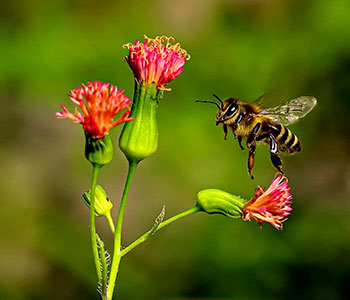
Honey bees versus wild bees. A real conflict?
Time and again we read and hear that the fostering of honey bees has a negative impact on the countless species of wild bees, which incidentally also include bumblebees. Austrian master beekeeper Ernst Brandl recently commented on this in a guest commentary in the Austrian daily newspaper Der Standard. We summarise.
Source: Brandl, Ernst. Warum die Wildbienen wirklich sterben (Why wild bees are really dying.) Der Standard, 7 May 2024.
Related article: Declining potential nectar production of the herb layer in temperate forests under global change. Journal of Ecology, 6 May 2024.
May 2024
Beekeeping and hobby beekeepers have become en vogue. Who doesn't know a winegrower with beehives in their vineyard, companies that breed bees on their land or roofs or honey projects run by schools or local authorities. The concern for the survival of the honey bee and, with it, for the survival of humankind, drives many people to take action. But is this possibly backfiring because the countless measures in favour of honey bees are depriving wild bees, of which there are 700 species in Austria alone, of their livelihood?
This is because a conflict between honey bees and wild bees is often cited as the cause. And that honey bees are taking food away from wild bees due to their large numbers and intensive pollination activities, thus contributing to their decline. Media reports, such as in the Austrian daily newspaper Der Standard ("Wir brauchen nicht noch mehr Honigbienen" / "We don't need any more honey bees"), are fuelling this conflict. However, according to Austrian master beekeeper Brandl, there is no scientific evidence to support the accusations made. In his guest commentary the operator of the biodiversity project "Miëlo - Reclaiming Nature" argues that human intervention threatens the habitat of all bees and that a conflict between beekeepers and wild bee lovers is counterproductive.
No scientific evidence. Media reports about an alleged conflict between honey bees and wild bees are misleading. There is no scientific evidence that honey bees are responsible for the decline of wild bees. Historical data shows that the number of honey bee colonies has remained stable, while biodiversity has declined dramatically. It is only our harmful environmental practices that are leading to species extinction - they have more immediate effects. Brandl calls for stricter controls on the use of pesticides and for political measures to limit soil sealing.
Beekeepers and wild bee enthusiasts should work together as they have common goals: healthier habitats, insect-friendly landscapes and the preservation of biodiversity. Initiatives such as educating the public and creating pesticide-free habitats could improve the situation. The contrived conflict between honey bees and wild bees only distracts from the real ecological challenges. Wild and honey bees play an important role in pollination and global food production, which also indirectly influences the decline in bird populations - bees serve as food for many birds.
And what can we do? Flowering meadows instead of ornamental lawns, flowering native plants and herbs in the garden or on the balcony and as many wild corners in the garden as possible, among other things with »» stinging nettles, to promote both honey bees and wild bees.




